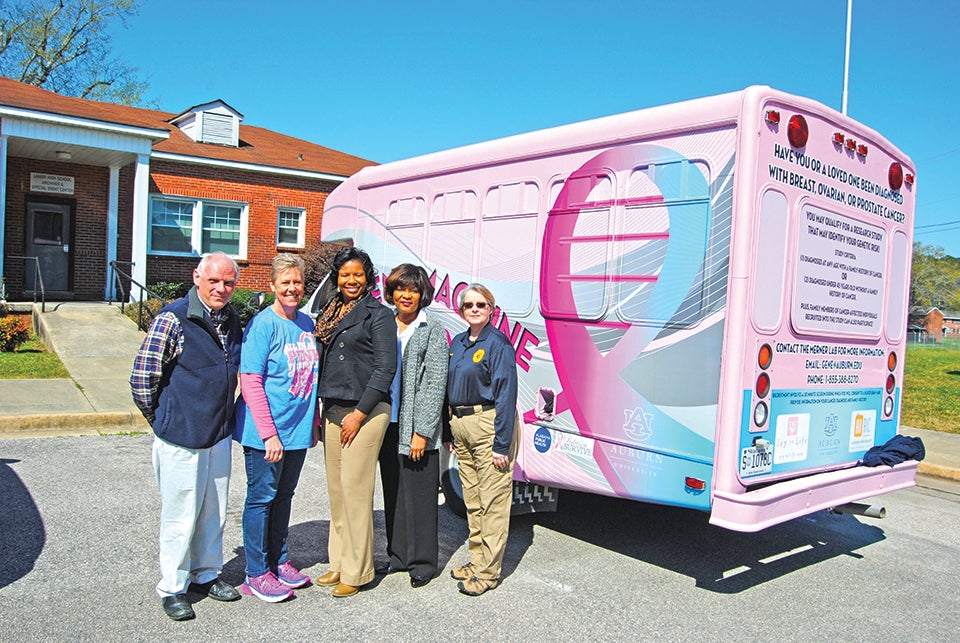Gene Machine stops in Lanett
Published 8:01 am Wednesday, March 14, 2018

- Wayne Clark | Times-News THE GENE BUS: Auburn University’s Gene Bus was in Lanett Monday. Betsy Stallworth, R.N., second from left, was in town to recruit people for a research study that can identify the risks local people have of getting breast, ovarian and prostate cancer. Greeting Stallworth at the L.B. Sykes Community Center were Mayor Kyle McCoy, far left, and at right, Narfunda Ross, Sandra Thornton and Police Chief Angie Spates.
LANETT — Anyone who caught sight of a pink bus in Lanett on Tuesday should know that it’s not just a vehicle with an unusual appearance, it can also save your life.
It’s Auburn University’s Gene Machine and it travels throughout the state of Alabama to spread the word about risk factors that could lead to breast, ovarian and prostate cancer. Gene Machine personnel talk to support groups, family reunions and civic groups about research studies that can identify those who are high risk for cancer.
They can do this by getting blood samples submitted by volunteers. The individual’s DNA can be extracted from this and can be analyzed.
“It’s a trust-building procedure,” said Betsy Stallworth, R.N. “We ask people to give of themselves in order to offer them information on their health. We enroll people, and get some blood from them. We can scan for 87 different genes.”
An enrollment session usually takes half an hour. Applicants are guided through study consent forms and provide information about demographics, cancer diagnosis and family history. A blood sample is collected for DNA, which is stored in a bio bank and used for genetic analysis. If a blood sample is not possible, a saliva sample can be used.
It’s important to screen those individuals with a family history of cancer. These individuals can be can be screened for 87 genes that are known (or thought) to increase the risk of breast, ovarian or prostate cancer, including BRCA-1 and BRCA-2.
If a mutation is detected, participating family members are screened for the mutation. Ultimately, this screening determines the individuals in the study who have inherited mutations in known cancer genes and identifies participants who need more screening.
Dr. Nancy Merner and members of the research laboratory at the Auburn University College of Veterinary Medicine focus on cancer genetics through novel gene discovery efforts. Their mission is to educate people about cancer risk factors and offer research participation to interested individuals across Alabama with the ultimate goal of better understanding why certain individuals and families have cancer.
The Gene Machine reaches people who live in remote areas. They may be unable to travel on their own to places like Auburn and UAB, where donations can be made. At some county health departments in Alabama, participants can receive counseling via telegenic carts. In other words, they can speak to a counselor in a remote location via a video screen.
Coming to the Valley is like coming home to Stallworth. She’s quite familiar with the area having worked as a nurse at Lanier Memorial Hospital (now EAMC-Lanier) for five years.
“I enjoy driving the Gene Machine, going places and meeting people,” she said. “We have a very good partner in WHIP, which stands for Working to Help those In Pink.”
In February, WHIP played host to an event at the Jane Farrar Event Center in Lanett. An estimated 30 women with a family history of cancer were present, and each one brought a friend with them.
Members of WHIP are looking at doing a follow-up event sometime this summer on the playground across from W.O. Lance Elementary School. It would be both fun and educational with vendors and a deejay.
“It’s wonderful to work with (WHIP members) like Sandra Thornton and Narfunda Ross,” Stallworth said.
“We teach and preach to people in the local community not to be scared,” Ross said. “Get regular checkups and learn how to check yourself each month. Women should get mammograms at least once a year.”
Dr. Merner obtained her Ph.D in 2011 from Memorial University in Newfoundland, Canada and completed her post-doctoral fellowship at the University of Montreal. Through her training, Dr. Merner has been involved in numerous gene discoveries. She has been at Auburn since 2014, focusing on cancer genetics because of her own family history and the overall need for further advances.
For more information about the Gene Machine program and how to enroll, go to the Gene Machine on Facebook or call (855) 388-8270.





